This week marks the true beginning of the end. At last, we have reached the final disc of this seven-disc compilation. There will be time for sober reflection later; for now, let’s plunge right ahead with the smack-talk, the petty sniping, the pointless bickering and the Mom jokes! (Yeah, we know what you like.)
#1 Bananarama, ”Venus” (1986)
A cover of the song by the Shocking Blue. A #1 in the US, Canada, Australia, NZ, South Africa, and Switzerland — though it only hit #8 in the UK.
Jack Feerick — This marks our second altercation with the UK production team of Stock, Aitken and Waterman, who sent seemingly dozens of dance-poppers to the top of the charts, none of whom you would later be able to pick out of a police line-up. Rick Astley is probably their most notorious creation. But unlike the studio tea-boy that the trio transformed into a pop idol on a bet (or so the legend goes), Bananarama had a career before SAW got hold of them, doing quirky, slightly loopy girl-group pop, some of it surprisingly dark-edged. Tonally, they were more akin to the Fun Boy Three, with whom they collaborated on a ghostly version of the Gershwin standard ”It Ain’t What You Do.”
Stock, Aitken and Waterman were responsible for some of the most profoundly irritating pop music in history. ”You Spin Me Round,” from a few weeks ago — that was our first encounter with SAW, and it’s the template for their sound. Tinny toy keyboards, chicken-wire rhythm guitar, and drum machines set to emulate the tone of a coffee-can filled with roofing nails. A nasty metallic clatter.
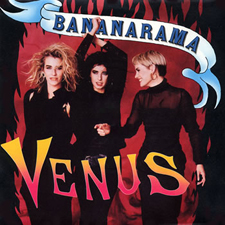 Anyway. Bananarama were around before their flirtation with SAW, but not for long afterwards. Siobhan Fahey, at least, managed to recapture some of their former weird, dark energy in her work as Shakespear’s Sister.
Anyway. Bananarama were around before their flirtation with SAW, but not for long afterwards. Siobhan Fahey, at least, managed to recapture some of their former weird, dark energy in her work as Shakespear’s Sister.
Dw. Dunphy — A little Bananarama goes a long way. This and “Cruel Summer” is all most people remember of them, other than they never harmonized as much as they sang on top of each other. That got pretty old fairly quickly. That’s about all I have to say on the subject. (Yawn.)
Dave Medsker — Does anyone else think the bass line in “Venus” sounds a bit like Ministry’s “Everyday is Halloween”?
Cummings — I wasn’t a fan of “Venus” in the original Shocking Blue version, and while Bananarama’s is infinitely better, it’s unfortunate that this was their biggest hit. Bananarama was a group I really liked — one of my guiltiest pleasures of the ’80s (and I’ve rarely actually felt guilty about guilty pleasures), before and during their SAW period. My Rock Yearbooks, and listening to “Rock Over London” on the radio, sent me after import 12″ singles of tracks like “Really Saying Something” and “Robert De Niro’s Waiting” … and I still dig “I Heard a Rumour.” But “Venus”? As early SAW, it’s certainly more lovable than the same sound would become a couple years later, but still … meh.
Dave Lifton — Way to neutralize those Townshendian suspended chords, guys. Jerks.
#2 The Bangles, ”Walk Like An Egyptian” (1986)
#1 US, Australia, Belgium, Canada, Germany, Holland, Spain, South Africa; Top ten everywhere else… except France. Bastards!!
http://www.youtube.com/watch?v=3OMxC7te5Ks
Feerick — There are a bunch of Bangles songs that I like, but their big hits are not among them. (That’s because I m insufferably cool, and I was into them way before you got into them, which is about the time at which they sold out. Of course.)
They had a great sound (skillfully-rough garage rock with ethereal floating vocals), some strong originals, and generally-solid instincts for cover material. But this and ”Manic Monday” (which was even bigger and which I hate with a blazing fury) both shade too far into novelty-song territory.
This was also the beginning of the end for the Bangles as a group and the advent of The Susanna Hoffs Show Featuring Some Bangles. I’ve talked before about the industry’s difficulty in marketing bands with woman singers as bands; multiply that by the difficulty in marketing bands with multiple lead singers, another thing they don’t do terribly well. For every Beatles who could make it work as a long-term model, you’ve got Curt Smith being squeezed out of Tears For Fears, the tensions between Ric Ocasek and Ben Orr tearing the Cars apart, the Davies brothers throwing punches around.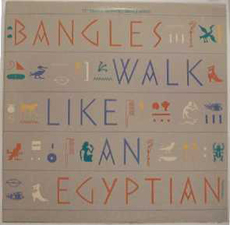
Dunphy — But to be fair, on the Curt-free TFF albums, Roland was covering the entire vocal spectrum. There were many times I was unaware that it was Curt singing during his moments.
Feerick — And I’m sure there were plenty of Bangles listeners who were unaware that Mickey Steele or the Peterson sisters ever sang lead — an impression only bolstered when the label started selecting only Susanna Hoffs songs as singles.
Sure, the camera loves Susanna and her freaky-deaky eye thing, but the relentless focus on her…
Medsker — The Mayan Eye of Coitus beckons. I am too weak to resist.
Feerick — PULL IT TOGETHER, MAN. My point is that the Bangles’ original multi-lead-singer model was their secret weapon. They did this thing that I always associated with The Band, of passing the verses around between the singers, which gave them both a strong identity as a group and a pleasing diversity of sound. What the label did was more than turning Susanna into the de facto lead singer of the Bangles (the Levon Helm, to continue the analogy) — they tried to turn the Bangles into the backing band for Susanna Hoffs. They misunderstood the nature of what they had ion their hands, and sold it short. That’s some savvy marketing, there, taking an asset and turning it into a perceived liability.
Dunphy — So I know everyone fell hard for Susanna, but I had a crush on every member of this group. But enough about that. The Bangles made very good pop music when they weren’t falling down the power ballad sinkhole. It’s not their fault. Everyone was doing it. Heart was doing it for crimeny’s sake, and I thought they were supposed to be tough.
But a little of “Egyptian” makes up for a lot of “Eternal Flame.”
Cummings — I never had a problem with “Walk Like an Egyptian” — in fact, I loved it without reservation — until I saw Behind the Music and heard about how Debbi was frozen out of the song’s recording by the choice to use a drum machine. Suddenly, in retrospect, the sight of her pretending to whistle during the bridge (it was actually a synth) became pathetic — and, as Jack says, it became clear that “Egyptian” was the beginning of the end for the Bangles as The Best Girl Group Of The ’80s. Still, love the song — and loved it even more once I heard Marti Jones’ story about recording the demo version (and the demo itself).
Lifton — Great track — I particularly love the tone of the bass, to say nothing of the line that propels the music — but it’s still a dumb song. I’ll take “If She Knew What She Wants” or “Going Down To Liverpool” over this any day.
#3 Art of Noise featuring Max Headroom, ”Paranoimia” (1986)
US #34, UK #12
http://www.youtube.com/watch?v=dPVsTcdydPI
Feerick — I don’t think I’ve ever heard the same version of this twice. That’s the trouble with the Art of Noise—and indeed, with Trevor Horn’s 80s output generally — there are so many variants and remixes that it’s hard to call anything definitive.
The video version (”How do I get to sleep?”) is the single version; it sounds authentically paranoid, and I find it genuinely unsettling. The MP3 above, which is included on the Like, Omigod! boxed set, is the 12-inch single mix, with Max doing his master-of-ceremonies shtick: ”Is it me, or is the band getting bigger?” It’s probably truer to the Max Headroom character, all dumb catchphrases and silly puns about B-list celebrities. (Also, it recalls the Bonzo Dog Doo-Dah Band’s wonderful ”The Intro and the Outro,” which for my money is no bad thing.)
(Notice I’m not devoting any attention at all to the ”stuttering vocal sample” effect that characterized Max; it was probably the very thing that made the AoN people want to do this in the first place, but for me it is the least interesting thing about the character, and about the song.)
Opinions on Max Headroom as a cultural phenomenon? I didn’t think we in America really got Max as he was intended. The short-lived hour-long sci-fi drama Max seemed wrong-headed, in retrospect; the character is more effective when the metafictional stuff is in the background, and Max is free to act as a satirical figure. The original UK Max Headroom chat show, it seems to me, was a precursor to the sort of unhinged media spoof that reemerged with Space Ghost Coast To Coast ten years later.
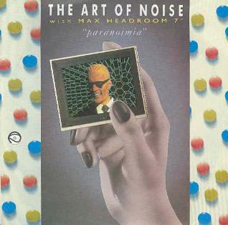 Dunphy — The thing about this 12-inch mix is that it has very, very little Max Headroom on it. It is much more AoN in that it is interesting on the verge of being kind of annoying. Not that the “Max dialogue” version, which is in every way a novelty track, is less annoying — but it holds my interest a bit more.
Dunphy — The thing about this 12-inch mix is that it has very, very little Max Headroom on it. It is much more AoN in that it is interesting on the verge of being kind of annoying. Not that the “Max dialogue” version, which is in every way a novelty track, is less annoying — but it holds my interest a bit more.
Thinking about the show Max Headroom, all the things you said about Max as semi-satirical talk show host are the things that endeared me to the ABC series. Here was a show that actively, and often blatantly, gave its masters the middle finger. In its day I enjoyed it because there was nothing that looked like it, or paced like it, on network TV. That was the point. It was spastic, jittery and pseudo-documentary. It highlighted the most insane, wrong-headed concepts for TV programming in sly background jokes. Almost presciently, the onslaught of “reality TV,” specifically those that highlight the American Freakshow ethos have rendered as real what the show’s creators meant as far-fetched and absurdest.
A side note: the Max Headroom show’s Executive VP was Phillip DeGuere, who previously had a hit with Simon & Simon and made a valiant go with CBS’ first revival of The Twilight Zone. Upon accepting the job as Max’s network consigliere, DeGuere moved over head writer Michael Cassutt and one of T-Zone’s more memorable writers. Cassutt was accepted but the other writer was not, his vision being deemed as not getting what Max was about.
And that writer, purportedly, was George R.R. Martin (Game Of Thrones).
Lifton — I did not understand the appeal of Max Headroom, nor do I now.
Feerick — I thought that you, as a Chicagoan, would at least appreciate the anarchic spirit that led to the legendary pirating of WTTW’s signal…
The perpetrators, by the way, were never caught.
#4 Orchestral Manoeuvres in the Dark, ”If You Leave” (1986)
US #4, but only hit #49 in the band’s native UK.
Feerick — Never had any use for anything OMD did, before of after. Hate the music, hate the voices, hate the hair, hate the clothes. They’re just good enough to remind me of the Blue Nile, who were doing the same kind of thing but doing it much, much better — so much better that I end up just being angry that I’m not listening to the Blue Nile right now instead.
Dunphy — I think OMD’s longtime fans were shocked by this, but the track in and of itself (being a new romantic / John Hughes-connected) is about as good as you were getting in pop at that time. The squeaky singing voices don’t date too well though.
Cummings — Jack’s hatred for OMD I find sad…
Feerick — Oh, Jon, when will you learn that your disappointed tears are as sweet, sweet nectar unto me?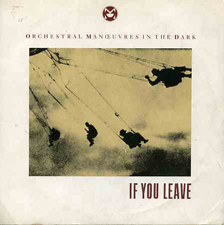
Cummings — … because they were without doubt one of my favorite bands of the ’80s — an adoration built primarily on my love of their Junk Culture album from 1984 (“Tesla Girls,” “Locomotion,” “Talking Loud and Clear” … I get shivers of joy just thinking about them). I have a high tolerance for synth-pop, I suppose — my wife used to hate it when I would (frequently) play the greatest-hits albums by OMD or the Pet Shop Boys straight through on a road trip.
A few weeks ago we were talking about Simple Minds’ “Don’t You (Forget About Me),” and Jack and I disagreed on the extent to which that John Hughes-related track represented a departure from the band’s earlier sound. In this case, there’s considerably less room for debate — “If You Leave” fit much more organically into OMD’s sonic trajectory, and radio-hit history, than Simple Minds’ track had. OMD were lucky that a track that they apparently tossed off in a few hours to meet a deadline, yet somehow fully represented their appeal, was released in a context that would guarantee their biggest audience ever.
Lifton — One of those songs that I’ve learned to appreciate over the years, but I have no idea why. The lyrics are silly and the vocals are thin and weak. Maybe it’s because I hear a genuine pop song in there buried beneath all those synths.
#5 Georgia Satellites, “Keep Your Hands To Yourself” (1986)
Peaked at #2 on the Hot 100.
Lifton — One listen to the last 10-15 songs we’ve discussed and you can hear why this was so popular. It was a pure reaction against everything else. No synths, just some classic 12-bar powered by Baird’s ’57 Esquire. Hell, even Springsteen was synthed-up by this point. But the Satellites, along with the T-Birds, SRV and Robert Cray, were really the last stand for straightforward guitar-based blues rock on the pop charts. Sigh.
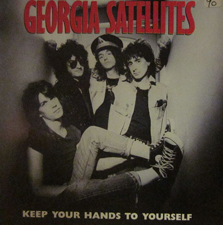 Dunphy — I like it, but in many respects I blame the Satellites for the chaw-spittin’, truck-lovin’ boot-draggin’ nonsense that permeates modern Nash-country music. It’s not the band’s fault. I know they could not have foreseen the crap like “Honky Tonk BaDonkADonk” sharing DNA with what would become their huge hit, but you can absolutely trace the lineage. Now there hardly is any humor in the attempts to be like “Keep Your Hands To Yourself.” It’s rock guitars, a lyric that is only a list of “stuff I got and like and is Ah-murrcan” and so on. Love this song, but hate what it hath wrought.
Dunphy — I like it, but in many respects I blame the Satellites for the chaw-spittin’, truck-lovin’ boot-draggin’ nonsense that permeates modern Nash-country music. It’s not the band’s fault. I know they could not have foreseen the crap like “Honky Tonk BaDonkADonk” sharing DNA with what would become their huge hit, but you can absolutely trace the lineage. Now there hardly is any humor in the attempts to be like “Keep Your Hands To Yourself.” It’s rock guitars, a lyric that is only a list of “stuff I got and like and is Ah-murrcan” and so on. Love this song, but hate what it hath wrought.
Feerick — Funny that you should peg the GeoSatz as some sort of outlaw country outfit, Dw., cos it seems obvious to me that they wanted — as so many have wanted before them — to be the American Rolling Stones. They would never have the Stones’ stylistic reach, or their deep bench of great songs, but they had enough playful swagger to sell a couple of good singles.
That said, I always preferred ”Battleship Chains,” which has only two chords as compared to the three of ”Keep Your Hands To Yourself,” and is thus at least 33% more awesome for doing more with less.
Cummings — Lifton neglects to mention the Black Crowes, who followed relatively closely on the Satellites’ heels with a revitalization of blues-based Southern Rock — and I’ve always kind of attached the Satellites to the Crowes, rather than to the hat-country acts Dw. mentioned with their too-frequent, eye roll-inducing puns and double-entendres. (Not that the post-Garth generation invented those puns and double-entendres — they’ve been a cherished, if cringe-causing for outsiders, tradition in country music from Jimmie Rodgers forward.) “Keep Your Hands to Yourself,” love it or hate it (and I love it), is not half-assed in its wit the way so many of those Nashville cookie-cutter hits are. It’s a genuinely funny song that somehow manages to avoid being a novelty.
Dunphy — The thing with Georgia Satellites over The Black Crowes is that I always saw the former as being more interested in the overall ethos, where what I mostly got from the Crowes was that they would rather have been the Faces… and Chris Robinson really liked his weed.
Feerick — As did the Faces. Carry on.
Cummings — I’ll happily chime in with Jack’s affection for “Battleship Chains,” which I was absolutely convinced was going to be a chart-topper until it petered out at #86, once again proving either the listening public’s stupidity, or else my complete ineptitude at calling such shots. Or both.
Feerick — If critics got to pick the hits, Jon, it would be a very different world indeed. And considering the kind of band that usually earns the label of a “critic’s darling,” it’s probably a good thing, on balance, that we don’t.





Comments